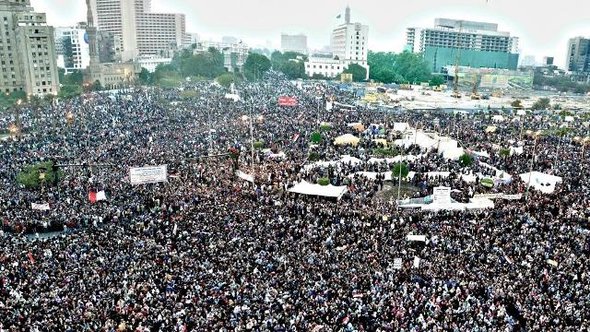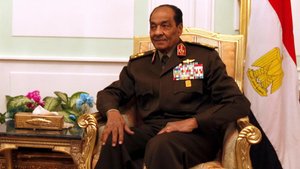''The Arab Uprising Was Not about Liberal Democracy''
Andrea Teti is a lecturer in International Relations and an expert on contemporary Middle East affairs at the University of Aberdeen, Scotland, and the European Center for International Affairs, a Brussels-based independent, non-profit, policy think tank.
Does Egypt have better chances today to become a liberal democracy compared to one year ago?
Andrea Teti: That is a million-dollar question. What I would say is that the uprising was not about liberal democracy. In the west, we've become accustomed to thinking about democracy as something which has more or less to do with voting, free speech and freedom of information. For Egyptians across the political spectrum – and this is true across the Arab world – the issue is much broader than that. They wanted political rights but they also wanted social justice.
The people want the downfall of the regime – not just that of Hosni Mubarak. That challenge is much greater than simply switching to free and fair parliamentary elections.
In Egypt today, the situation remains very fluid. It's still possible that there is a movement toward democracy but it requires a very fine balance of conditions and, frankly, the precedents that have been set over the past year are not particularly encouraging.
A year ago, Mubarak was ousted, but some of his cronies are still in power – how much influence do they have?
Teti: It's hard to get more influential than Field Marshall Tantawi, who was defense minister under Mubarak. But there are other figures as well, the military is a roll call of the powerful in Egypt under the Mubarak regime. What this is indicative of is a system which has really changed quite little at the top since the uprising. In fact it seems to be determined to change as little as possible and even reverse the changes that have occurred since the ouster of Mubarak.

The question is: does the military simply want to secure their interests – which economically are enormous, estimates go from 5 to 40 percent of the economy – or does it no longer trust that a civilian administration would respect those red lines. Do they actually want a much more prominent, formalized role in Egyptian politics?
In public, the military has been committed to transition toward a civilian state, but if you look at what's happened since the uprising on issues like emergency law, the persecution of pro-democracy activists, the crackdown on independent trade unions – in practice you have to be sceptical about their commitment. Their record looks at very best ambiguous.
We hear a lot about the Muslim Brotherhood – apart from the military, which groups have the greatest power in Egypt at the moment?
Teti: There's the military and the Muslim Brotherhood – which is not a uniform, monolithic organization. Both during the uprising and since then, we've seen splits within the Brotherhood, and there's a prominent Islamist candidate who is apparently going to run for president and used to be a member of the Muslim Brotherhood.
There are lots of different currents within the Brotherhood, a split between the older and younger generations. It seems the older members are more in control of the organization and more willing to compromise with the military. There are the Salafists, who have been the big surprise of the recent elections, gaining far more than had been expected.
But it's easier to say who has the least power: the groups that actually led the uprising. Like the liberal, pro-democracy NGOs that have come under sustained attack over the last year, notoriously in December with the raiding of groups like the National Democratic Institute, the International Republican Institute and Freedom House. They've been left out in the cold by the Muslim Brotherhood and Islamist forces in general but are still powerful enough to negotiate directly some kind of deal with the military.
You've already mentioned the volatile security situation in Egypt at the moment. What other challenges does the country face?
The people's call for the downfall of the regime represents, in a nutshell, the biggest challenge to Egypt today. What people demanded was the downfall of the regime, not just Mubarak, but the entire system that exploited the poor economically and politically.

It was and is the main goal to build a more inclusive and representative society both politically and economically. To do that, there are three categories of problems: first, security sector reform; second, economic reform and third, political representation.
Security sector reform is perhaps the one that receives the least attention, especially in the non-Egyptian press. This is a practical issue but it has deep political roots and implications. Before the uprising, the security establishment as a whole basically felt they could operate with impunity outside the law, simply bending it to serve their purposes. This hasn't substantially changed since Mubarak's departure. There have been moments, there have been advances but these have always been problematic, there have always been setbacks. So, this remains one of the first and foremost things that need to be done.
The other two issues, economic and political reform, are more headline-grabbing, but no less thorny. At an economic level, what has happened is that the relative impoverishment of considerable proportions of the population will worsen by liberalization policies pursued by the Mubarak regime. There were comments at the time of the uprising that 40 percent of Egyptians live on less than $2 (1.5 euros) a day, 20 percent live on less than $1 a day – these are conditions that were far worsened by the liberalization processes.
In fact, talk about liberalization is not appropriate because what you've observed is actually a kind of Russian-style oligarchization: the state assets would be transferred from state control into private hands, but not a real kind of liberalization.
Politically, it is a problem with representation. The old political class had no credibility, no legitimacy whatsoever, it was deeply corrupt. So this is the daunting task that new MPs in particular face.

It's a problem for the Muslim Brotherhood because it faces a dilemma: on the one hand, the easy way to stay in power and achieve the objectives it has had since 1928 when it was established – to get into power and try and Islamize society – is to compromise with the military. The problem is the price of that is they effectively equate themselves with the old regime.
Four, five yeas down the line, when new elections come again in a best-case scenario, voters will make them pay for this because the kind of economic policies and political programs they have and that kind of compromise would require are not the sort of policies people turned out in their millions in the streets to call for.
How can the EU help Egypt solve these problems?
Teti: The EU is one of the main democracy donors in the region, for Egypt in particular. In theory, they've tied economic aid and trade to democracy and human rights conditions and the problem they've had is that these conditions have never been enforced. You end up in this situation in which democracy-related aid tends to become a form of state subsidy. This has to change.
There's a degree of recognition of this in Brussels, they've brought out a revised policy since last March. But looking into the policies and details they propose, there seems to be a great deal of continuity with earlier policies, i.e. this kind of problematic conditionality. Their proposals for how to support inclusive growth which they acknowledge is important to political transition, they say, the way we achieve this is by further liberalization. What the EU ought to be doing is to be supporting in practice and not just in principle economic as well as political inclusion.
I think there's an obvious obstacle: this kind of social inclusion and the political representation is exactly going against the grain of what had been happening in Europe over the last 30 years. Imagine if Catherine Ashton or Mario Draghi or any major EU official went to Cairo and announced a policy that said: you know what, the democratic uprising is the best way to achieve democracy, it involves having a strong pluralistic political and civil society and that means having strong and independent trade unions and a fairer distribution of wealth. Can you imagine what the reaction in Athens, Rome, Madrid or even London would be?
It entails a complete reversal of the kinds of policies European member states have been pursuing domestically and this is why I think there's a serious political problem to pursuing those policies both toward Egypt and the region as a whole.
Interview: Anne Allmeling
© Deutsche Welle 2012
Editors: Rob Mudge/Deutsche Welle, Lewis Gropp/Qantara.de
